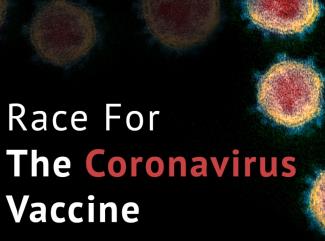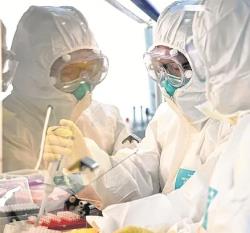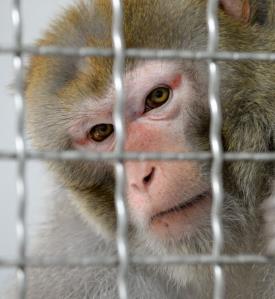 The COVID-19 vaccine under development by the Edward Jenner Institute for Vaccine Research at Oxford University has been tested by the U.S. National Institute of Health in rhesus monkeys. Six vaccinated animals were unaffected after SARS-CoV-2 challenge over a twenty-eight day period compared to obvious clinical infection in non-vaccinated controls. The Oxford University vaccine is based on an adenovirus isolated from chimpanzees as the vector, modified to express SARS-CoV-2 antigen. The next stage is to progress to evaluation in humans, first for safety and then efficacy.
The COVID-19 vaccine under development by the Edward Jenner Institute for Vaccine Research at Oxford University has been tested by the U.S. National Institute of Health in rhesus monkeys. Six vaccinated animals were unaffected after SARS-CoV-2 challenge over a twenty-eight day period compared to obvious clinical infection in non-vaccinated controls. The Oxford University vaccine is based on an adenovirus isolated from chimpanzees as the vector, modified to express SARS-CoV-2 antigen. The next stage is to progress to evaluation in humans, first for safety and then efficacy.
 Based on the need for an effective vaccine, manufacturing facilities for the product have been identified and are being equipped to produce the vaccine in large quantities following regulatory approval. Given the world distribution of a vaccine, it is evident that the U.S. will have to have independent in production capacity to be able to vaccinate the entire population at least twice while making available vaccine for nations including Mexico that do not have production capability.
Based on the need for an effective vaccine, manufacturing facilities for the product have been identified and are being equipped to produce the vaccine in large quantities following regulatory approval. Given the world distribution of a vaccine, it is evident that the U.S. will have to have independent in production capacity to be able to vaccinate the entire population at least twice while making available vaccine for nations including Mexico that do not have production capability.
 It is axiomatic that restoring the lifestyle and the economy as we knew it will be dependent on durable immunity from a vaccine. As the approved product or analogues will be in short supply during the initial months of production there will be profound ethical considerations in relation to selection of early recipients. It will be critical to ascertain whether an adequate proportion of the population will actually be immunized by the vaccine the duration of protection and to determine the dose of antigen and frequency of administration. A second complication is whether adequate numbers of people will be willing to submit to vaccination given concerns and the influence of “anti-vaxers”. Annual influenza vaccinations have a low compliance rate although the fear of a new disease may encourage vaccination against both influenza and COVID-19. Herd immunity stimulated by either natural exposure or vaccination will be critical to maintaining a viable economy and our supply of food.
It is axiomatic that restoring the lifestyle and the economy as we knew it will be dependent on durable immunity from a vaccine. As the approved product or analogues will be in short supply during the initial months of production there will be profound ethical considerations in relation to selection of early recipients. It will be critical to ascertain whether an adequate proportion of the population will actually be immunized by the vaccine the duration of protection and to determine the dose of antigen and frequency of administration. A second complication is whether adequate numbers of people will be willing to submit to vaccination given concerns and the influence of “anti-vaxers”. Annual influenza vaccinations have a low compliance rate although the fear of a new disease may encourage vaccination against both influenza and COVID-19. Herd immunity stimulated by either natural exposure or vaccination will be critical to maintaining a viable economy and our supply of food.